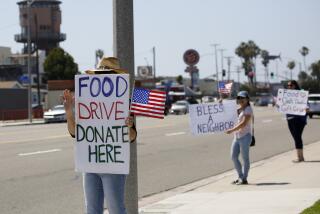How Government Can Help Boost Spirit of Volunteerism
- Share via
On Monday, a regional nonprofit summit conference at Chapman University will focus on leadership in community service volunteer organizations. It is a subject which was lost in the shuffle at the President’s Summit on America’s Future about which there was so much fanfare last April.
One important thing that got left off the President’s Summit agenda is the question of equal opportunity tax law. That needs urgently to be at the top of our political priority list now.
Equal opportunity tax law would treat volunteered services and support, time as well as money, on an equal basis. This means that all taxpayers would be given an opportunity to itemize both their gifts of time and their gifts of money. Such treatment would enable an unprecedented breakthrough of harmful barriers to voluntary action by everyone.
Our nation needs the widest participation possible by volunteers from all segments of society, not just those who are better off. Local issues are best addressed by local people who are most involved with them. If empowered, they can deal with them most effectively and economically. Grass-roots community-based action has the greatest chance of creating a peaceful and prosperous society.
But we must declare a new mandate for all Americans, and having an equal opportunity tax law would amount to having a new civic charter, in which we acknowledge the emergence of a new first sector in our society. Call it the civic sector. Here is where ordinary citizens volunteer their resources of time, talent and treasure for causes which they care about deeply. The number of these citizens probably exceeds those in the private sector of business and the public sector of government combined.
About 90% of the work force is employed in private and public sector work, and about 10% in voluntary service or nonprofit organizations. About half of all adults, 93 million at last count, say they volunteer an average of more than four hours per week for charitable causes. Many more volunteer time and energy in various associations and activities that are not formally organized or recorded.
Volunteerism is, as it always has been, the driver of grass-roots change that results in national policy. However, federal law favors higher-income taxpayers over lower-income taxpayers. In order to claim a charitable deduction for gifts to worthy causes, taxpayers must be able to itemize deductions for financial gifts on the long form income tax return filed each year with the Internal Revenue Service. Only about one third of American taxpayers do so.
Not only that, there is no provision of a tax benefit for the gifts of time and talent people contribute to charities. This excludes everyone who contributes their services from any benefits for volunteering, and especially most lower-income people, who contribute a greater percentage of their time and income than do higher-income people.
The result is that higher-income people receive favored tax treatment for their gifts to charity. On the other hand, lower-income volunteers who cannot itemize on their tax returns, and all people who contribute professional and other civic services as volunteers, receive no tax recognition for their investment of human capital in the form of time and effort.
For years, adult Americans have consistently been contributing more or less 2% of the gross domestic product, which is the output of all goods and services of a nation’s economy, to charity at the most recent rate of $150 billion annually. Also for years, as already noted, more or less 50% of adult Americans consistently have contributed volunteer services for worthy causes, most recently at the rate of $200 billion annually. We have been stuck at these proportionate levels for years. It is time that we remove the impediments to voluntary support and service.
By enacting this idea of an equal opportunity tax law, we would enable an explosion of American assistance to those causes we support the most. This is what the President’s Summit did not discuss and what a future national summit should do.
The numbers would jump dramatically. People are increasingly busy and need to have a good reason to give voluntarily of their services and support. And those who are less busy need to be asked, like the others.
So, let’s get on the ball and pass a tax bill that honors these realities with a response that makes more sense and is consistent with what the President’s Summit was supposed to have done.


